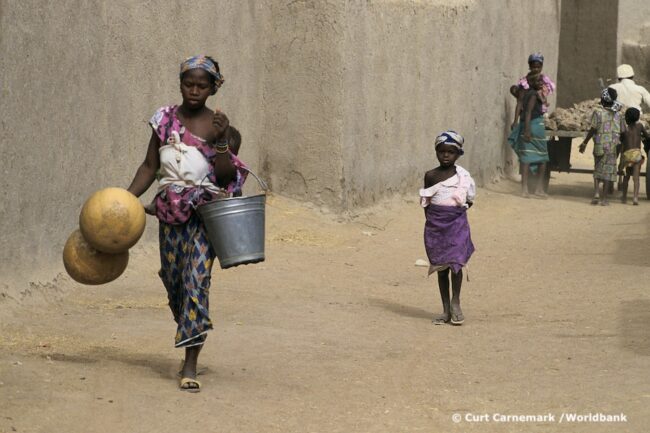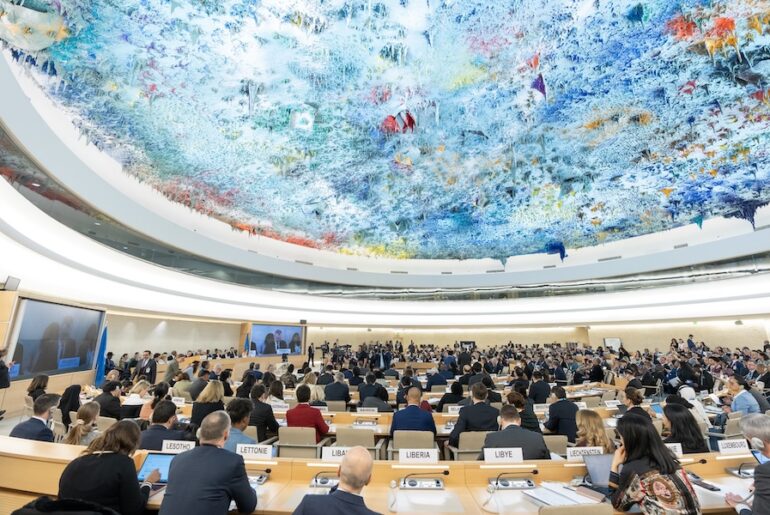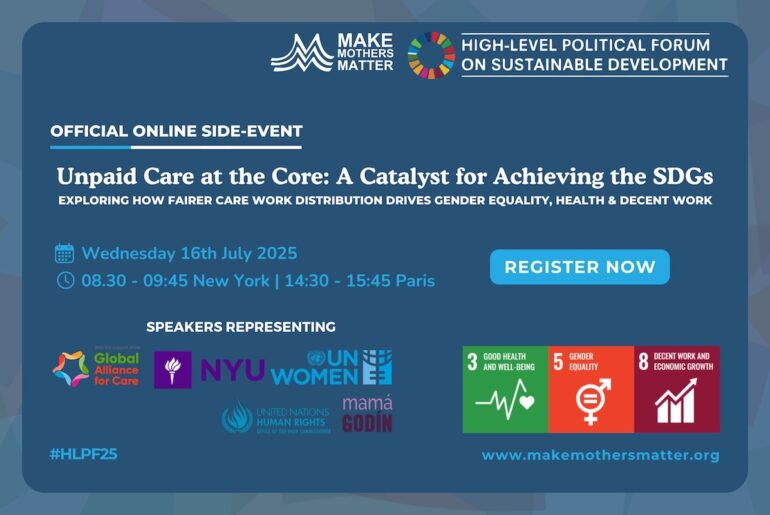Addressing crises through a ‘Care lens’
10.06.24
UN New York – MMM's written statement, which was submitted ahead of the UN High Level Political Forum (HLPF), sheds light on the impact of the different crises we face globally on unpaid care work, which remains disproportionately shouldered by women, in particular when they are mothers. It also calls for a 'care lens' when responding to crises so that they do not exacerbate gender inequalities, and argues that transforming to a caring society and a wellbeing economy could not only advance gender equality but also help mitigate or even prevent these crises.

The multiple and mutually reinforcing crises that the world faces today not only jeopardize the realisation of the 2030 agenda, but threaten the future of humanity: the aftermath of the covid-19 pandemic, the rising number of conflicts and humanitarian crises, the energy and food security crises triggered by the Ukraine war, inflation, the debt crisis, the ageing of the population and looming care crisis, the climate emergency and other environmental crises – all have set back progress on many fronts, in particular poverty.
Generally, crisis-related hardships combine and compound pre-existing disadvantages; they exacerbate inequalities. But all these crises also have a common thread: a disproportionate negative impact on women, undermining progress on women’s rights. In particular, most of them directly or indirectly increase the time and energy women spend on unpaid domestic and care work, its inequal distribution at the root of gender inequalities.
How do crises affect women’s unpaid care work?
The pattern is more or less always the same: in times of crisis, women act as a shock absorber. Through their unpaid care and domestic work, they compensate for disruptions in the provision of public services (e.g. health, schools, water…) and resource availability (e.g. income, social benefit, food…) – a fact which remains generally ignored when addressing these crises.
The statement further elaborates on the cases of climate change, the debt crisis, and inflation and how these crises impact women’s unpaid care work.
Why it matters
We know that gender equality is key for development and the realisation of the 2030 agenda and its 17 SDGs, and that the unequal distribution of unpaid care and domestic work remains the main structural barrier to progress on gender equality. Taking a care lens and addressing this issue is all the more important in the context of crises to mitigate their effects.
In turn, gender equality and women’s empowerment can generate peace and resilience dividends: women often make significant contributions to peace-building and the strengthening of social cohesion, as well as enhancing community resilience to disasters and climate change.
Could a ‘care lens’ mitigate the impact or even contribute to solutions?
The ‘3Rs’ framework (Recognise-Reduce-Redistribute), which is widely used to formulate care policies, is undoubtedly useful as it provides concrete avenues on which policy makers can act.
But basically, we are only patching our current economic and social systems, which are still based on patriarchal and now obsolete assumptions. Women have tried hard to adapt, but this logic must be reversed: our systems must be adapted to the realities of care needs and women’s lives – with care being considered in its broadest meaning and also include care for the environment.
In addition, most of these crises, in particular climate change, environmental degradations and rising inequalities, have their roots in an economic system which totally ignores both the environmental impact of economic activities and the unpaid domestic and care work that sustains society and all the other economic activities. The fixation on GDP growth also ignores deepening inequalities and promotes economic activities that do nothing to improve people and planetary wellbeing – which should be the main objective of governments at every level.
We are therefore calling for a systemic transformation to a caring society and wellbeing economy, which would not only contribute to recognising, redistributing and supporting the work of caring, in particular mothers’ work – which is central to ensure the sustainability of life, wellbeing for all, and advance gender equality – but also contribute to mitigating or even prevent global crises, beginning with climate change, environmental issues and rising inequalities.
The High Level Political Forum, which convenes every year to review the implementation of the 2030 development agenda and its 17 Sustainable Development Goals, will take place 8-17 July 2024 at the UN in New York under the theme: Reinforcing the 2030 Agenda and eradicating poverty in times of multiple crises: the effective delivery of sustainable, resilient and innovative solutions.
Envisioning care as a common thread to global crises
29.07.24
UN New York - Our virtual HLPF side-event brought together experts to shed light on how the various global crises we face (in particular climate change and other environmental crises,
We call for multi-stakeholder approach to recognise and support unpaid care work
21.07.24
UN New York - Participating in the meeting of the UN Economic and Social Council (ECOSOC) on care and support systems, MMM reaffirmed the principle of co-responsibility, which should underpin
The New EU Gender Equality Roadmap : A Call for Inclusion of Mothers
04.03.25
The European Commission’s initiative on a new Gender Equality Roadmap post-2025, marks a significant step forward in addressing gender disparities across the European Union. Make Mothers Matter (MMM








